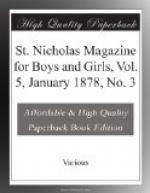DARK SUNS.
Here’s something strange,—so strange that, may be, you ’d better inquire further into it. I give you the paragram just as it comes to me:
“The bright star Sirius, itself a vast flaming sun, has a companion which is also a sun,—nearly seven times as large as our own,—but which is dark, and gives no light at all. This dark sun was seen through a very powerful telescope in 1862, and it is thought that there are a great many like it, although no others have been found.”
THE LETTER-BOX.
To the little girl who
asks if Bryant wrote any poem that would
interest “us children”
and to all young readers of ST. NICHOLAS:
Yes, indeed. You will find in the collected works of this beloved American writer many songs and poems that you can understand with ease and read with delight. A good, pure-hearted man, like William Cullen Bryant; a man so honest, so simple and earnest, so truly great, that with a deep knowledge of the world about him he worshiped God, honored his fellow-man, and loved nature as a child loves its mother—such a man could not be far removed from young sympathies. He could not be a poet without singing, sometimes, just the song that little folks would love to hear.
And children, themselves, were dear to him. More than once in the course of an acquaintance that dates back to our own early youth, we have seen his eyes light with pleasure at some incident of boy and girl life. Often his kindly interest and hearty words about St. Nicholas have given us better hope and courage to try to make the magazine just what it should be. “Good!” from his quiet lips was well worth striving for. His standard in everything was high. Hear “The Old Man’s Counsel,” which, through his own verse, he once gave to his own heart.
“Wisely, my son, while yet
thy days are long,
And this fair change of seasons
passes slow,
Gather and treasure up the
good they yield—
All that they teach of virtue,
of pure thoughts
And kind affections, reverence
for thy God
And for thy brethren; so when
thou shalt come
Into these barren years, thou
mayst not bring
A mind unfurnished and a withered
heart.”
But Bryant was not always solemn in his teaching. If you like playful, sprightly verses that yet are full of poetry, read his “Robert of Lincoln,” where
“Merrily swinging on brier
and weed,
Near to the nest
of his little dame,
Over the mountain-side or
mead,
Robert of Lincoln
is telling his name:
Bob-o’-link,
bob-o’-link,
Spink,
spank, spink;
Snug and safe is that nest
of ours,
Hidden among the summer flowers.
Chee,
chee, chee.”




